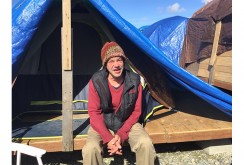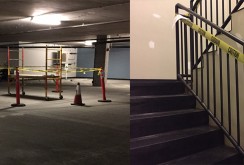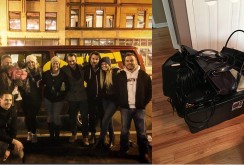
3234 17th Ave. W. occupies half a block in the trendy Interbay neighborhood, but it is not a prestigious address. In fact, it does not even warrant a mailbox. Instead of concrete condos or live-work housing mushrooming from the spot, rows of crayon-blue and khaki-green tarps stretch over camping tents pitched on wooden platforms. For some 60 people, single men and women, couples and at least two families with teenage kids, right now, these tents are home. And something more – a haven.
On the afternoon The Connector dropped by, Tent City 5 was almost a ghost town. The people who live there don’t sit around idly, explains, Charlie Johnson, a member of the elected council that oversees operations and enforces the rules there.
“A lot of them work or volunteer, so in the day, the place empties out,” he says. The undeveloped plot that lies under the latest of the Seattle area’s sanctioned encampments for people attempting to escape homelessness is leased for a year, with an option to extend it for a second year.
Most of the people who were there in the middle of the afternoon were reorganizing their communal kitchen, at that point a set of aluminum-tube frames on a large stage, the covers blown off by a recent windstorm. The encampment, like two others in Seattle and on the Eastside, are under the auspices of SHARE, which stands for the Seattle Housing and Resource Effort (though it takes some digging around their website to find that out).
Residents form an Executive Committee that is responsible for site security, resident identification and donations management. The five members are chosen for 30-day terms. They enforce SHARE’s Code of Conduct, which prohibits alcohol, drugs, coming into Tent City high or bringing in weapons, fighting, abuse of any kind, littering or disturbing neighbors. The residents also make rules and determine the direction of things in the camp at their regular Tuesday meetings.
The City of Seattle provides about two-thirds of the funding for Tent City 5, through funds allocated to the Seattle Low Income Housing Initiative, and passed through to SHARE. Apart from working closely with the local police, Charlie says Tent City has no direct contact with the city administration. Still, Charlie is positive about the City’s role.
“The City and the mayor wanted to do something and this is a good experiment,” he says. “I think it’s a worthy experiment because, to many people, this is the first chance they get to get socialized.”
For people who have been living on the streets in a state of hypervigilance, like a soldier waiting for the battle to begin, this is a safe place to begin interacting with other people without the cloud of fear. It can also be the first stop to finding help, from the monthly visit of the Public Health van, or obtaining referrals to social services and even housing. But, Charlie cautions, for many of the folks that come in to Tent City, just finding an apartment is not enough to solve their problems. He sees the supportive environment and structure that Tent City imposes on their lives as a necessary step for those who come here and stay.
“This is like a transition zone for some people,” he says. Without a transition zone of this sort, he fears many of the people he sees in Tent City 5 would not get the help they need to get off the streets.
Tent City, like other homeless encampments before, has been tarred with claims of a increase in crimes and vagrancy around them. But the residents deny that, and crime statistics from the Seattle Police Dept. bear that out. On the contrary, Charlie insists, having a place like Tent City 5 in the neighborhood cuts down on people sleeping in parks and alleys by giving them a place to go, and reduces crime and drug use, since those activities are not tolerated there and Tent City security patrols the vicinity to make sure.
Tent City 5 runs on donations, both of cash to SHARE and in-kind donations. Local church groups cook meals and the area food banks contribute food, but nonperishable food is always welcome, as are blankets. Tarps (“because we’re always going through them”), batteries of any size – since TC5 does not have electricity on site – and dry shoes, are especially high on their perennial wish list.
SHARE/WHEEL Needs your Support!
SHARE was founded in 1990 and WHEEL was founded in 1993. SHARE and WHEEL are self-organized, democratic, grassroots organizations of homeless and formally homeless individuals. For 22 years, they have been working to eradicate homelessness, educate the community, and empower homeless people. SHARE is the national leader in breaking down attitudinal & unconstitutional legal barriers to Tent Cities, as well as Seattle’s largest network of indoor shelters that are all self-managed.
SHARE is underfunded and needs your support. Please contact Michele Marchand
Michele@sharewheel.org 206-956-0334 or 206 448-7889
Tent City 5 doesn’t get mail but can get deliveries: FedEx or UPS.
3234 17th Avenue West, Seattle, WA 98199
Email: tc5interbay@sharewheel.org
or call the SHARE offices at either (206) 956-0334 or (206) 517-9011.
Donations Needed:
Batteries (all sizes)
Milk Crates
Sleeping Bags
Blankets
Flashlights
Folding or Outdoor Chairs
Plastic Garbage bags
Rope/Cording/Zip Ties
Plastic Utensils
Hot Food (to deliver) Sandwiches, Coffee, Milk, Juice













